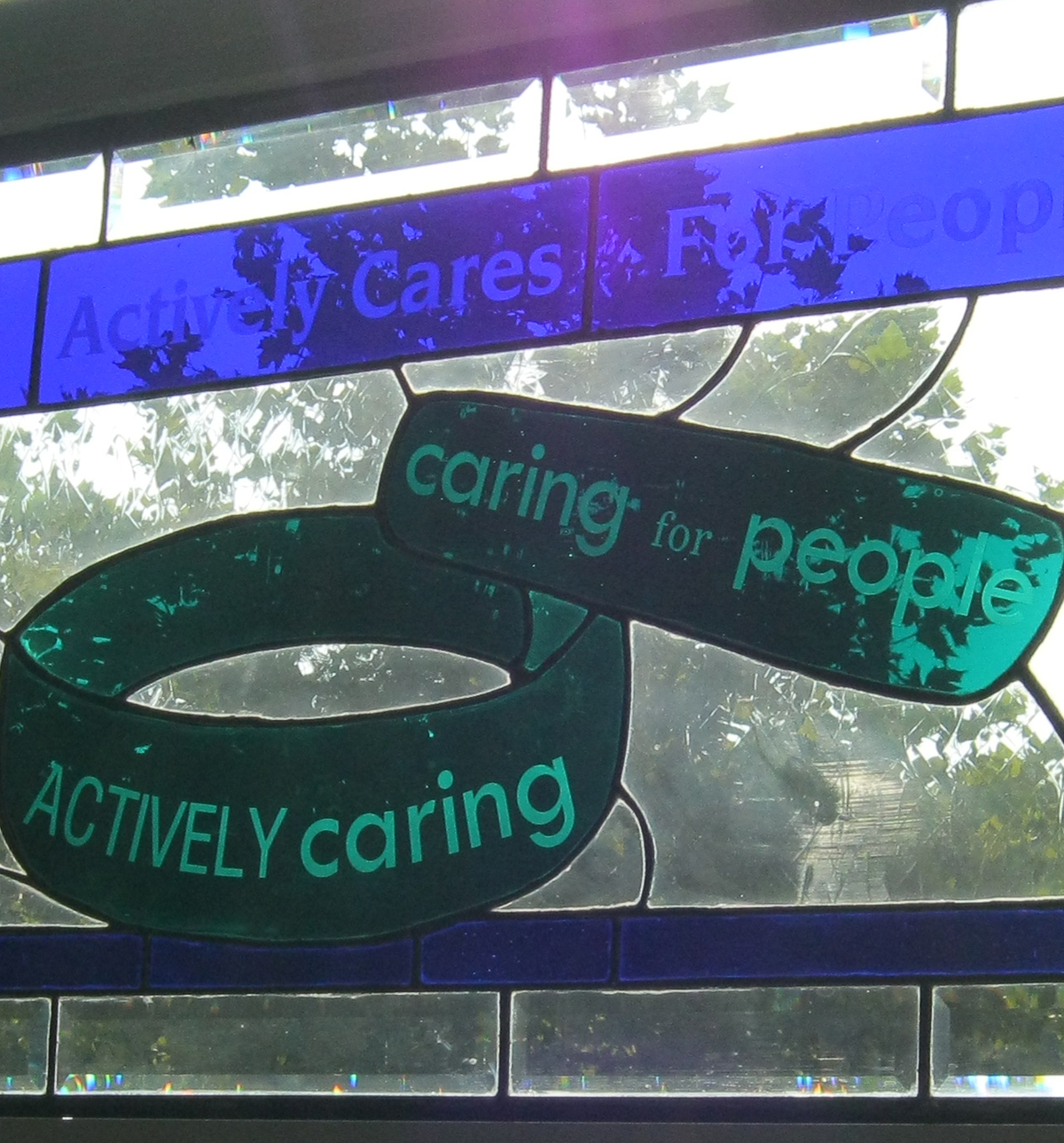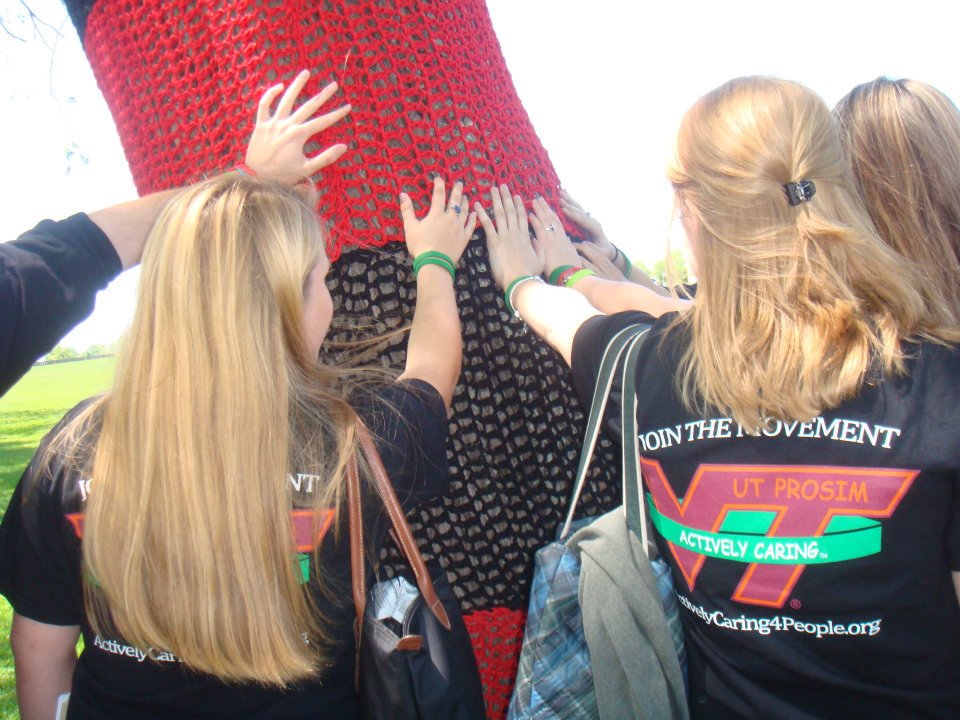Psychology team helps students actively care for each other

The inventions of the future aren’t necessarily made of sub-atomic particles or complex algorithms. Sometimes they are based on the simplest of premises – treat others, not as you would wish to be treated, but as they would like to be treated.
That’s the ‘platinum rule’ of E. Scott Geller’s lifework - Actively Caring for People. The AC4P movement, which started more than 20 years ago with industrial safety issues, is now a book which was released in November. With a new generation of adherents taking the message on the road and into schools, they are inventing a better future at every stop and carrying the Virginia Tech motto of Ut Prosim (That I May Serve) along with it.
Geller, Alumni Distinguished Professor and director of the College of Science's Center for Applied Behavior Systems in the Department of Psychology, wrote the first three chapters of the new book which details the principles of developing an actively-caring culture. He left most of the rest of the book to 39 co-authors including former students, current graduate students, and men and women around the country who have used the principles to better their organizations, communities and homes.
“The question is, how we can be better at reducing conflict and increasing positive exchanges between people,” Geller said. “When people read this book, they’ll read the principles and then the real-world application of those principles reported by others who have used them to help make safer drivers, decrease binge drinking and interpersonal bullying, cultivate safer communities, and even help reduce identity theft. All through compassion and looking out for one another.”
To do any of the things he lists, Geller says people first need to learn to communicate more effectively, especially as it pertains to listening with empathy. “One of our key points is trying to understand the other person’s story,” he said. “Our common sense is biased. Everyone has their way of seeing the world. We need to learn the perspective of the other person and find out where they’re coming from. We need to have the courage to speak up and provide behavior-based feedback; the humility to accept constructive feedback; and the integrity to adjust our own behavior based on that feedback.”
As a noted speaker in the safety arena, Geller said his students have spread the caring approach by taking what they’ve learned at Virginia Tech and applying it to other areas – most notably schools.
Shane McCarty, a former marketing undergrad who made the switch to psychology after meeting Geller, leads a team of coaches who reach out to schools and talk about the AC4P program. The coaches provide training, and mentor students so they can mentor other, younger students. McCarty’s first school visit was one that had an immediate empathetic connection with Virginia Tech.
In February 2012 at Chardon High School in Chardon, Ohio, three students were killed and three more injured when a teenager opened fire in the school. The school reached out to Geller and his team and since that time McCarty and more than a dozen Virginia Tech AC4P coaches have made several trips to Ohio to teach principles and applications of the approach.
“We made our first trip in May,” explained McCarty, “and we’ve gone up about every two months since. Students there are getting a sense of personal control that they can move forward. What’s more, they want to spread it to other schools in the area, so that’s what we’re working on now, coaching them to be mentors for middle school students.”
The schools McCarty and his team work with in Ohio and Northern Virginia teach students to pass on their commitment to actively caring through the use of green wristbands embossed with “Actively Caring for People”.
The wristbands denote someone who has cared for another. Team members distribute wristbands to students as part of a workshop where students share ideas and experiences of helping and being helped by others. Then those students, when they encounter an act of caring, hand over the wristband to the person who helped, along with the AC4P message and instructions for continuing to pass it along.
At Berkshire Local Schools in Ohio, Doug DeLong, the superintendent and a former principal at Chardon, is a proponent of both the AC4P program, and the green wristbands. “Berkshire received a Drug and Safe Schools Grant from the Ohio Department of Education about 18 months ago and the school brought in assembly speakers; but we didn’t have a program to instill on a consistent basis,” he said. “We needed a ‘pay it forward’ atmosphere and commitment within the school. I heard about the Virginia Tech program and when Shane and the coaches came to Berkshire we had a flood of students who wanted to be part of AC4P. Our students came up with ideas to spread the word of kindness and they’ve formed their own club. I've given green wristbands to our elementary principal and she’s already passed some out to parents and students for acts of kindness.
“I’ve been at this a long time, and it takes a lot to inspire me,” DeLong said. “I listened to Shane’s presentation and went through the training myself. I’m excited. It’s reinforced my long-held belief in paying it forward.”
Students at another elementary school wanted to pass the message forward through a class project and so they had built and installed a stained glass window that includes four AC4P wristbands that hangs in their cafeteria.
In Chardon, the principal told Geller and McCarty he hopes AC4P lives forever at the high school. “They’re making it part of their culture,” said Geller. “And we get similar feedback from other places we go.”
At the Blacksburg Middle School, Virginia Tech students work with teachers to promote the culture change. “Wearing the AC4P wristband has power,” said Andrea Langston, a middle school teacher and author of Actively Caring in a Middle School: A Teacher’s Journey - chapter 13 of Geller’s book. “It’s more difficult to act unkindly or bully someone when you have the AC4P band on your wrist.”
The ‘power’ Langston describes is not an unusual term for what McCarty sees during his work with schools. “The band is a commitment,” he said. “It’s a commitment to get involved and to care and it makes a great deal of difference, especially to younger people who are often caught up in peer situations. Teachers have always believed more caring is what needs to happen. Showing we can reduce the bad stuff, like bullying, through caring, is reinforcing for teachers. They like the idea of putting something in the hands of students and allowing them to take the principles we teach and make it fit their own culture.”
In the end, actively caring is about creating a culture where people feel free to care for the well-being of others.
The AC4P book and workbooks for schools are one way to help the culture take root, and Geller thinks the movement is at a tipping point.
“My students are going to be challenged to write another chapter,” Geller said. “This is just exhibit-A, we need to make more exhibits and get people talking and providing case studies. We need people putting their stories of caring for others, or their stories of witnessing an act of compassion on our AC4P website. Someday, I’d like to see a book with only stories from the website.
“In all the traveling I’ve done, and in all the talks I’ve given, I have never, not once, had anyone say to me that this is a bad idea.”





